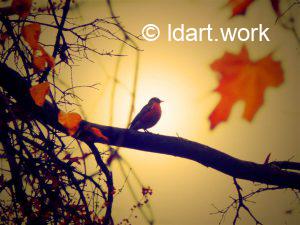
About humans and their questions
A dialogue between Gottfried the bird and Baruch the heron. Gottfried thinks that each being is independent but part of a logical and harmonious whole, accessible through singing. Baruch spends a lot of time still and this allows him to understand that everyone is a unique and particular, yet in relation with others and the universe.
Gottfried: tell me, Mr. Heron, does Socrates come to see you regularly with his questions?
Baruch: oh yes, he disturbs the fish when he does it but he distracts me and he is not mean.
Gottfried: it’s true, he seems harmless but he reminds me of humans, always worried, always uncertain. As if we had to understand the why of things when the world could not be better.
Baruch: that’s their nature I guess. They want to have clear ideas before deciding anything, this is how they come to certainties. When they walk around the ponds, I hear them and I tell myself that they are rarely a quiet species. Niccolò is undoubtedly responsible for the situation.
Gottfried: yes, you’re right, he made them lose their innocence and their trust.
Baruch: they now need to discuss everything to reach a consensus, yet they have remained very individualistic.
Gottfried: this is still one of the paradoxes that characterize them. Alone, they could let themselves be guided by their instincts and their intuitions, but because the group always asks them for justifications, they must find rational arguments.
Baruch: the only advantage is that the rules they create for living together allow them to fight against their selfish inclinations.
Gottfried: it’s only because they’re not selfish enough to understand that being good is the best way to preserve yourself. Replacing common sense with obligations is less effective.
Baruch: you are right, but acting collectively is not necessarily a bad calculation for survival.
Gottfried: no doubt, but I still prefer my independence. I’m going to tell you a secret about humans: sing and they’ll give you seeds, especially in winter. It proves that they have not lost their sense of harmony, just forgotten it exists because they ask themselves too many questions.
Baruch: that’s interesting, my dear Gottfried. The problem for me is that I sing badly and don’t like seeds. Do you think they would have fish?
Gottfried: I don’t know but their feeders are small, you couldn’t perch there. In addition, you are right, your song is not very harmonious, it might annoy them.
Baruch: that’s the fate of those who are different, they don’t attract compassion. How can I please them?
Gottfried: by your patience and your wisdom, dear Baruch. This is what attracts Socrates, this is what should make them like you.
Baruch: you are right, that suits me well, but will they come to feed me?
Gottfried: if you croak a little when they approach, they will probably be pained for you and be willing to help you!
Baruch: take care, my friend, my beak is powerful and I will cut your whistle if you make too much fun of me.
Gottfried: you will never catch me, dear Baruch, you are too slow to get started when you want to fly!
Analysis
Humans often seem worried and undecided.
Baruch attributes this inclination to the need they have to organize their societies with rules known and understood by all. This induces a lot of questioning on the best way to establish them but allows the group to prosper.
Gottfried thinks that they should listen to their intuitions in order to understand the harmony of the world and know how to follow it. It would allow them to be more confident and make them better. That his songs softens them make him believe he’s right.
Possible discussions
Acting according to your intuitions, is it possible?
Why does contemplation erase questions?
Finally
Want to think a a little more? See, for example, The Political Treatise where Spinoza defines the principles of political philosophy.
Want to improve these dialogues? Write your comments and questions below.
Want to know more about the tastes of Baruch and Gottfried? Their favorite books are in the domain library.


Heron thanks you for your delightful comments and Bird think you shouldn’t waste your time with city birds but wish you a good day looking at them in Cambridge anyway 🙂
typo-Mexican carved snake cane
OH! What a delightful dialogue & respite from my hectic day in very cold Cambridge, watching the European starlings peck the ground at Harvard Sq, the bright red Romeo cardinal woo for a mate, bounding squirrels in the sunshine…
The heron is a symbol of health & whenever one flies over head, the elegant breastbone and aerodynamic graceful great wingspan, I pause to thank for my well-being. The Mexican carved sake cane I use was my grandmothers, possibly from her mother-in-laws international travels. The power of venom & shedding teaches us of transmutation if we are willing. Merci beaucoup for this fresh air!